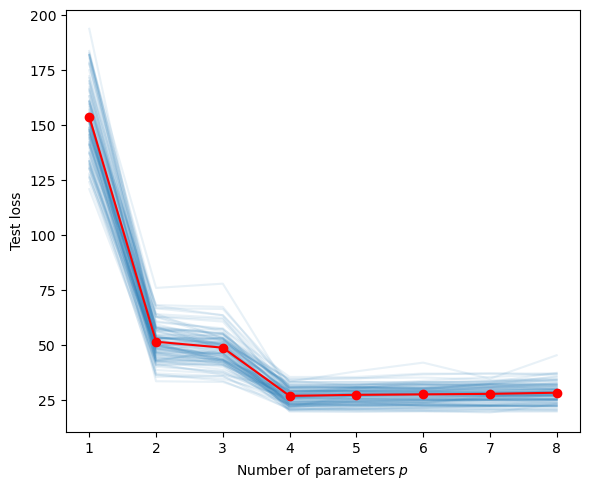4. UNIT 3. Monte Carlo methods#
This Unit includes an introduction of Monte Carlo methods in Machine Learning, strongly based in [1].
Evaluate $\( \mu = \int_{-\infty}^{\infty} \int_{-\infty}^{\infty} \int_{-\infty}^{\infty} \sqrt{|x_1+x_2+x_3|} e^{-(x_1^2+x_2^2+x_3^2)/2} dx_1 dx_2 dx_3 \)$
import numpy as np
from numpy import pi
c = (2*pi)**(3/2)
H = lambda x: c*np.sqrt(np.abs(np.sum(x,axis=1)))
N = 10**6 # sample size
z = 1.96 # confidence interval 95%
x = np.random.randn(N,3)
y = H(x)
mY = np.mean(y)
sY = np.std(y)
RE = sY/mY/np.sqrt(N)
print('Estimate = {:3.3f}, CI = ({:3.3f},{:3.3f})'.format(
mY, mY*(1-z*RE), mY*(1+z*RE)))
Estimate = 17.043, CI = (17.028,17.057)
Estimating the generalization risk for the polynomial regression in [https://biocomputing-teaching.github.io/Data-Science-with-Python/code/UNIT2-Statistical-Learning.html](the previous chapter). To do so, we take the average of the test losses after running a given number of training and tests sets.
""" CMCtestloss.py """
import numpy as np, matplotlib.pyplot as plt
from numpy.random import rand, randn
from numpy.linalg import solve
def generate_data(beta, sig, n):
u = rand(n, 1)
y = (u ** np.arange(0, 4)) @ beta + sig * randn(n, 1)
return u, y
beta = np.array([[10, -140, 400, -250]]).T
n = 100
sig = 5
betahat = {}
plt.figure(figsize=[6,5])
totMSE = np.zeros(8)
max_p = 8
p_range = np.arange(1, max_p + 1, 1)
for N in range(0,100):
u, y = generate_data(beta, sig, n) #training data
X = np.ones((n, 1))
for p in p_range:
if p > 1:
X = np.hstack((X, u**(p-1)))
betahat[p] = solve(X.T @ X, X.T @ y)
u_test, y_test = generate_data(beta, sig, n) #test data
MSE = []
X_test = np.ones((n, 1))
for p in p_range:
if p > 1:
X_test = np.hstack((X_test, u_test**(p-1)))
y_hat = X_test @ betahat[p] # predictions
MSE.append(np.sum((y_test - y_hat)**2/n))
totMSE = totMSE + np.array(MSE)
plt.plot(p_range, MSE,'C0',alpha=0.1)
plt.plot(p_range,totMSE/N,'r-o')
plt.xticks(ticks=p_range)
plt.xlabel('Number of parameters $p$')
plt.ylabel('Test loss')
plt.tight_layout()
plt.savefig('../figures/MSErepeatpy.pdf',format='pdf')
plt.show()

Dirk P. Kroese, Zdravko Botev, Thomas Taimre, and Radislav: Vaisman. Data Science and Machine Learning: Mathematical and Statistical Methods. Machine Learning & Pattern Recognition. Chapman & Hall/CRC, 2020. URL: https://acems.org.au/data-science-machine-learning-book-available-download (visited on 2023-08-15).
